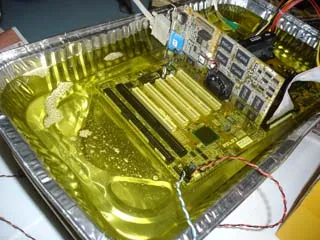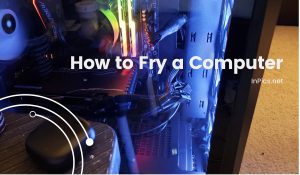Have you ever wondered how to fry a computer? Maybe you’re a curious tech enthusiast, or perhaps you’re looking for ways to destroy sensitive data. Whatever your reasons may be, it’s important to note that frying a computer is not a simple task. It requires a certain level of technical knowledge and expertise, as well as the right tools and equipment.
One of the most infamous tools for frying a computer is the USB Killer. This device is designed to deliver a high-voltage dose of electricity to a computer’s motherboard, effectively frying it and rendering the computer useless. While the USB Killer may seem like a simple gadget, it’s important to note that using it can be dangerous and potentially illegal in some jurisdictions. It’s crucial to understand the risks and consequences before attempting to use such a device.
Read also: Parts of a Computer and Their Functions
If you’re looking for other ways to fry a computer, there are several methods you can try. For example, you can run hardware stress testing programs like CinebenchR23 and Furmark simultaneously, generating a lot of heat for your computer. You can also unplug all the fans or seal any gaps that let air into the computer, effectively overheating it and causing damage. However, it’s important to note that these methods can be risky and may cause permanent damage to your computer. Understanding the potential consequences before attempting any of these methods is crucial.
Instead of frying a computer, simply disabling it might do, and we have an article about how to disable a computer you might want to see.

Understanding the Risks of Frying a Computer
If you’re not careful, it’s easy to fry your computer. A surge of electrical current or excessive heat can damage your computer’s hardware, rendering it useless. Here is something you need to know to prevent frying your computer.
Grounding Your Workspace
One of the most important things you can do to prevent frying your computer is to ground your workspace. Grounding helps to prevent static electricity from building up, which can damage the sensitive components of your computer. You can use an anti-static mat or wrist strap to ground your workspace. Make sure that you plug the mat or wrist strap into a grounded outlet.
How to Fry a Computer
Frying a computer can be an intentional act of sabotage or a result of a mistake. Regardless of the reason, it can be a costly and frustrating experience. In this section, we will discuss two ways to fry your computer: using an application and physically damaging it.
Using an Application to Fry Your Computer
One way to intentionally fry your computer is by using an application designed to push your hardware to its limits. These applications are often used by enthusiasts to test their system’s performance, but they can also be used to cause damage.
If you want to fry your CPU, you can use an application like Prime95 or AIDA64 to stress test your processor. Running these applications for an extended period can cause your CPU to overheat and fail. However, it is important to note that modern CPUs have built-in thermal protection that will shut down the system before any permanent damage occurs.
Another way to fry your computer is by using a USB killer. These devices are designed to look like a regular USB drive, but when plugged in, they send a high voltage charge to your computer, frying the motherboard and any other nearby components. To avoid falling victim to a USB killer, never connect unknown USB devices to your computer.

Physically Damaging Your Computer
Another way to fry your computer is by physically damaging it. This can happen by dropping your computer, spilling liquid on it, or exposing it to a power surge.
To protect your computer from power surges, use a surge protector. Surge protectors are designed to absorb excess voltage and protect your devices from damage. However, they are not foolproof, and a powerful surge can still cause damage.
Another way to physically damage your computer is by exposing it to lightning. If your computer is not plugged into a surge protector during a lightning storm, it can be fried by a power surge caused by a lightning strike. To avoid this, always use a surge protector and unplug your computer during a storm.
In conclusion, intentionally frying your computer is not recommended, and can result in costly repairs or replacement. However, by following these tips, you can protect your computer from accidental damage and avoid falling victim to malicious attacks.
Preventing Accidental Computer Frying
Accidentally frying your computer can be a costly mistake. Here are some tips to help prevent this from happening.
Security Measures to Protect Your Computer
One way to prevent accidental computer frying is to take security measures to protect your computer. This includes installing antivirus software, firewalls, and keeping your operating system and software up to date. This will help protect your computer from viruses, malware, and other malicious attacks that can cause damage to your computer.
Another important security measure is to use strong passwords and enable two-factor authentication. This will help prevent unauthorized access to your computer and ensure that your data is safe.
Regular Maintenance to Keep Your Computer Safe
Regular maintenance is also important to keep your computer safe and prevent accidental frying. This includes:
- Cleaning your computer regularly to remove dust and debris that can cause overheating.
- Defragmenting your hard drive to improve performance and prevent data loss.
- Backing up your data regularly to prevent data loss in case of accidental frying or other disasters.
- Keeping your computer in a cool, dry place to prevent overheating.
It is also important to be careful when handling your computer and to avoid exposing it to static electricity, which can cause damage to the transistor components. Always ground yourself before handling your computer components.
By following these tips, you can help prevent accidental computer frying and keep your computer running smoothly.
Read also: What are the uses of computers?




